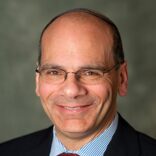I vividly remember each of the many times I was fortunate enough to meet with Pope Francis. The initial meeting was in June 2013, when the pontiff welcomed a group of Jewish organizations to the Vatican — the first of many such meetings of his tenure.
We were expecting a large ornate hall, complete with the new pope seated on a royal chair atop a riser. But Francis had not yet (reluctantly) given in to the reality of his position, the one where he led more than a billion Catholics and became, perhaps, the most recognized and influential person on Earth.
Instead, we met in an intimate room and he greeted us with his inimitable pastoral warmth. It was then when he said, referencing Nostra Aetate, the Second Vatican Council document that transformed Catholic-Jewish relations for the better:
…The Council recalls the teaching of Saint Paul, who wrote “the gifts and the call of God are irrevocable” and who also firmly condemned hatred, persecution, and all forms of antisemitism. Due to our common roots, a Christian cannot be antisemitic!
Francis continued to share words to that effect dozens of times during his 12-year tenure, even as recently as Easter during his final public appearance on Sunday. He did not mean that there was no antisemitism in the Christian world. Rather, he argued, it makes no sense to be a Christian antisemite, if you have internalized the teaching of Nostra Aetate.
At that 2013 meeting, the American Jewish Committee presented the pope a framed copy of one of its most historic and cherished photographs — when Rabbi Abraham Joshua Heschel met in March 1963 with Cardinal Augustin Bea at AJC headquarters in New York.
Heschel had been drafted by AJC to advise and guide the Church on its path to Nostra Aetate. Bea led the Vatican shift to a new, positive era in Catholic-Jewish relations. In 2013, a younger, healthier Pope Francis exclaimed with joy, “I know this picture!”
Indeed, he did. The pope had been among the first to implement the mandates of Nostra Aetate in his exemplary relationship with the Jewish community in his native Argentina.
And that’s the way it mostly was with Francis: a Catholic-Jewish lovefest in which he not only did what modern popes since Pope John Paul II did and had never done before — visit synagogues, make pilgrimages to Auschwitz and go on official state visits to Israel — but also had innumerable Jewish friendships, especially with native-Spanish speaking rabbis. He simply was comfortable among Jews.
But there was also, sometimes, a fly in the ointment. Francis, a folksy shepherd of his people, was not always as careful as a pope needs to be in adhering to the new post-Nostra Aetate language.
Never was there concern about what was in Francis’s heart, but sometimes his language revealed that he did not always understand that his words could be misused by others who had not accepted the advances of Nostra Aetate. When you are pope, everything you say matters.
So, for example, all the positive, empathetic things Francis did since Oct. 7, 2023 — his Oct. 11 statement that Israel had a right to defend itself; his meetings with families of hostages and injured Israelis; his repeated calls for the release of the hostages; and his reassuring positive February 2024 letter “to my Jewish brothers and sisters in Israel” — were not enough to allay the concerns regarding his seemingly harsh judgmental-of-Israel, post-Oct. 7 approach, which he manifest on many occasions in different ways.
I believe history will be kind to Francis in its evaluation of his Catholic-Jewish relations track record. There is no taking away from his affirmation in words and deeds that positive Catholic-Jewish relations are integral, perhaps even defining, for Catholicism. He guaranteed that the achievements of the last 60 years since Nostra Aetate were sustained and expanded, and that his voice was among the loudest and most influential in its condemnation of antisemitism.
We do not know for sure what will follow in Catholic-Jewish relations. There are possible popes who are like recent popes in their commitment to Catholic-Jewish comity. But there are also potential successors to Francis for whom that will not come naturally, not because they are ideologically opposed to the cause, but rather because the Church has expanded to regions where there are few Jews and few Catholic-Jewish relationships.
The latter does not preclude a continuation of the golden age in Catholic-Jewish relations, but vigilance will be required from both Catholics and Jews to make that happen.
I am optimistic, but optimism is only the beginning of a plan. There is a lot at stake for the Jewish people. There can be no going back to a darker era.
JTA has documented Jewish history in real-time for over a century. Keep our journalism strong by joining us in supporting independent, award-winning reporting.






